by Bronson Dubey
Boundless Way Zen Temple is a Buddhist worship center located in Worcester, Massachusetts. Officially founded in 2009 by Melissa Keidō Myōzen Blacker, Rōshi and David Dae An Rynick, Rōshi, it was created as a merger between the organizations of Boundless Way Zen and Boundless Way Temple. Also known as “Mugendo-ji,” Boundless Way has lineage roots in Japanese Sōtō and Korean Linji, offering Zen disciplines of breath practice, just sitting, and kōan introspection, among others. Central to all its teachings, Boundless Way Zen Temple holds the value of developing “the realization of non-duality and its compassionate actualization in everyday life.”
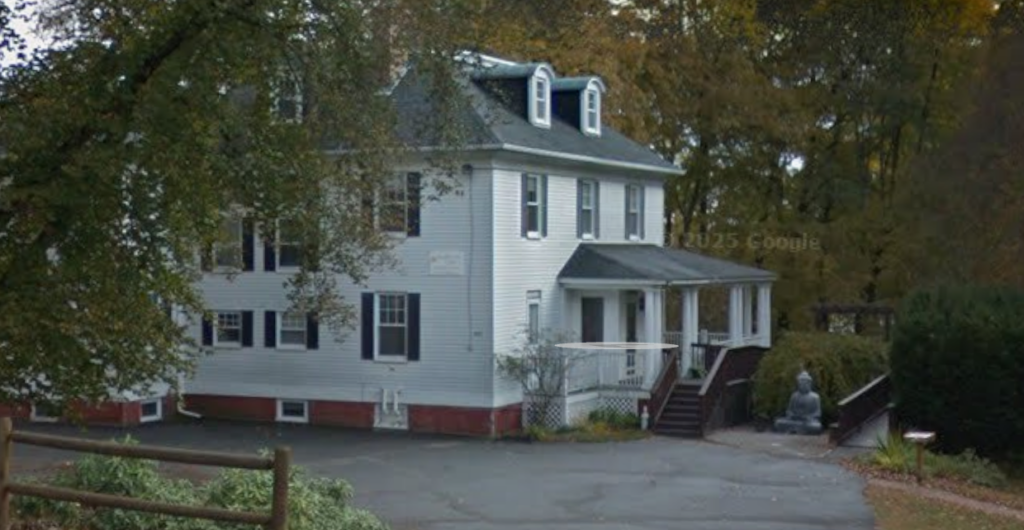
Abbot Melissa Blacker began her joint study of Zen with David Rynick in 1981 under teacher Richard Clarke. After 20 years, she became the student of James Myōun Ford, Rōshi of the Sōtō tradition. She was ordained as a Sōtō priest (unsui) in 2004 and completed shuso training in 2005. She received Dharma transmission from James Ford, Rōshi, in 2006, when she was subsequently elected a teacher of the Boundless Way Sangha, a group she had been a part of since its inception. In 2010, she received Inka Shōmei, which is the full acknowledgement of Zen mastery, again from James Ford, Rōshi. This mastery spans two lineages from Ford, being Sōtō through his teacher Jiyu Kennett, and the lay-kōan Harada-Yatsuni lineage through his other teacher John Tarrant. Finally, Blacker again received transmission from David Dae An Rynick in 2025.
After beginning his study of Zen with Melissa Blacker in 1981, David Rynick transitioned to George Bowman’s guidance in 1991, where he received Inga, or formal recognition as a Zen teacher and Dharma heir from Bowman in 2005. In 2006, Rynick was also elected a co-leader of Boundless Way Zen. In 2011, he received full Dharma transmission from Bowman in both the Linji tradition and Korean Seon traditions.
Boundless Way Zen Temple was formed by Blacker and Rynick to satisfy the growing needs of the Boundless Way Zen sangha in New England around the turn of the millennium. Smaller sitting groups had been gaining traction across the region since as early as 1992, when Blacker and Rynick were joined by friends for Zen meditation meetings in their living room. The first unified sangha, however, wasn’t created until 2004, when the Worcester Zen Community and other groups combined to form Boundless Way Zen. Outgrowing their living room, in 2009, Blacker and Rynick bought a home in Worcester, which they subsequently converted into the physical Boundless Way Temple, operating as its own organization under the same name. Soon thereafter, Blacker and Rynick combined the two organizations to form Boundless Way Zen Temple, where Blacker was elected as abbot.
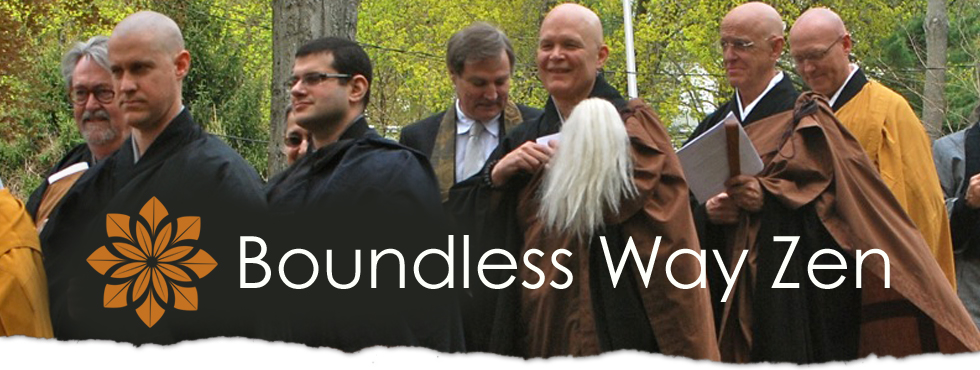
Boundless Way Zen Temple maintains a broad focus on Zen teachings, emphasizing that the “great project of Zen is awakening,” which is consistent with traditional Buddhist and Zen teachings. They acknowledge that the ultimate goal of reality is to become enlightened, but also recognize that “transformation of self and the world is called the Bodhisattva way,” seemingly positing that it is also one’s duty to help others also reach awakening. The mission of Boundless Way Zen Temple is stated as:
“to support a vibrant and inclusive Zen Buddhist practice for ourselves, for those around us and for those who follow us by:
- Sustaining a dedicated site for residential Zen retreats, training and special events, and daily practice;
- Establishing and supporting local practice groups (sanghas);
- Training Dharma teachers and practice leaders; and
- Supporting engaged Buddhist practice.
Through its lineages and offerings, however, they indirectly teach that there is more than one way to achieve enlightenment. Mainly, they offer several Zen disciplines, including shikantaza (just-sitting), kōan introspection, regular meditation, and sesshin (silent) retreats. They teach that rather than being one specific practice, Zen Buddhism is rather a state of mind and way of thinking that makes enlightenment possible, brought about by one or more ways of veneration. All of this is contained within the Boundless Way Zen Sutra Book, along with many other teachings from various aspects of Buddhism and Zen.
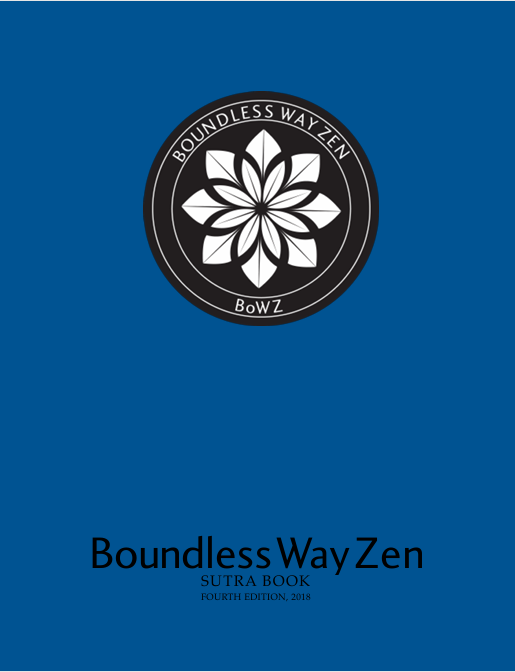
The worship organizational structure of Boundless Way Zen Temple also strays from traditional Zen practices. Collectively, worship leaders are referred to as “teachers” rather than the traditional name Rōshi, albeit this also means teacher. Boundless Way attributes this to the fact that “many aspects of teaching are functions genuinely shared by the whole community and not exclusively the work of those who possess formal Dharma transmission.” While Blacker and Rynick do in fact represent this highest honor, giving themselves the title of “Guiding Teachers,” they are not the only instructors at Boundless Way. The next step down is a Senior Assistant Teacher, a role that shares in the spiritual leadership of the community. These responsibilities include directing classes, conducting dokusan—formal interviews—and speaking formally with the community about details of practice and Dharma; however they cannot establish a shoken, or personal student-teacher relationships. The Guiding Teachers appoint Senior Assistant Teachers, of which there are currently four: Reverend Corwyn Miyagishima, Esther Sorgenfrei, Reverend Jenny Smith, and Pierce Butler.
Immediately following them are the Assistant Teachers, who follow the same rules to appointment and directives as Senior Assistant Teachers, except that they cannot formally speak in public regarding Boundless Zen’s practice, nor can they conduct interviews. There are five Assistant Teachers at Boundless Way: Craig Dreeszen, Reverend David Caruso, Madhusmita Dhakal, Steve Garabedian, and Todd Yonkman. Next are the Practice Leaders, who are temporarily appointed leaders of classes or retreats, responsible for the general direction of the sangha. Any member of the sangha can be deemed a Practice Leader, including Teachers and first-time participants. Boundless Way also utilizes Priests, or someone who has been ordained under the vow to “manifest the life of the sangha,” carrying out tasks supporting Boundless Zen operations, ranging from shoveling snow and leading a sitting group, to performing rituals and more.

Boundless Way defines members as any registered and donating devotee to the Temple, whose rights include first priority for classes and voting abilities at Leadership Council elections. As an organization, Boundless Way Zen Temple is governed by a Temple Leadership Council that is elected by the members. They, in conjunction with the Guiding Teachers, approve the budget, define membership, and otherwise develop the formal institutional structures of the Boundless Way sangha.

The Temple honors three Guiding Teachers Emeriti, who have previously taught at the Temple or are able to do so when they choose. James Myo’un Ford, Rōshi, teacher of both Blacker and Rynick, received Dharma transmission in Sōtō Zen from Jiyu Kennett, Rōshi in 1971, and Harada-Yasutani Inka Shomei from John Tarrant in 2005. He currently teaches at Empty Moon Zen Sangha Network on the west coast of the United States. Robert Ryudo Tetsumu Waldinger, Rōshi, currently serves as the Guiding Teacher of Henry David Thoreau Sangha in Newton, Massachusetts. He received Dharma transmission from Melissa Blacker in 2022 in both Sōtō as well as Harada-Yasutani, by way of Jiyu Kennett’s and John Tarrant’s lineages, respectively. Michael Shoryu Fieleke, Rōshi is a resident Teacher of Morning Star Zen Sangha after receiving Dharma transmission from David Rynick in Sōtō and Harada-Yasutani kōan through James Ford, and Korean Seon tradition through George Bowman.

Boundless Way Zen Temple boasts other Transmitted Teachers of the community that travel the area, seeking to spread the dharma and grow the sangha. Alan Sanhyō Richardson, Sensei served Boundless Way in several leadership roles starting in 2007. He received Dharma transmission from David Rynick in 2021 and Denbo transmission in 2025. Dharma Holder Michael Sōkei Herzog joined the Temple in 2011 and was granted transmission by Rynick in 2022 after also serving in several positions. Dharma Holder Reverend Paul Ryūdō Sōshin Galvin was granted transmission by Melissa Blacker in 2024 after beginning his study under her in 2004.
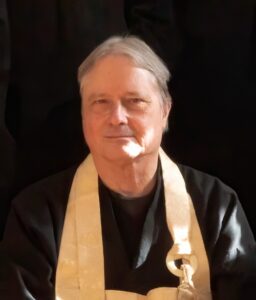
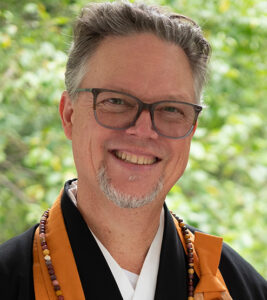
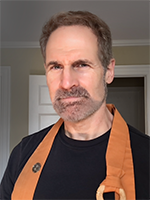
Finally, several other former members of the Boundless Way Zen Temple have also obtained Dharma transmission from either Blacker or Rynick. James Myōsan Cordova, Sensei, was given Denbo transmission in 2016 from Blacker. Diane Ryūdō Shōshin Fitzgerald, Sensei, received hers quickly afterwards in 2017, along with Dominik Hōzan Kulakowski, Dharma Holder. Esther Sōkyo Sorgenfrei was granted Denkai transmission by Rynick in late 2025.

This rapid explosion of growth of the Boundless Way sangha is noteworthy. James Ford attributes the success of Blacker and Rynick’s students to the attractiveness of Boundless Way Zen Temple’s form of worship. He posits that Boundless Way’s combination of Sōtō, lay-kōan, and Seon teachings draws in newcomers who can connect with various pieces of each. Moreover, Ford argues that this combination and recent growth submits a claim for Boundless Way to be its own Zen school. This is further solidified by the fact that several current and former Teachers of Boundless Way have founded branches of the Temple across New England and around the world. Dharma transmitted Waldinger and Fieleke started Boundless Way Zen of Northampton, Massachusetts. Dharma Holder Paul Galvin started Snow Mountain Boundless Way in Wilmington, Vermont. Practice Leader Jamie Paul runs Islesboro Community Boundless Way Zen in Maine. Esther Sorgenfrei operates a Boundless Way Zen Temple in Copenhagen, Denmark. Other branches exist in Pittsburgh, Pennsylvania and in China.

Not all of this growth may be positive, however. The governing structure of Boundless Way Zen Temple used to be very different, with a system of checks and balances keeping the religious aspects separate from the legal aspects of the organization. This changed in 2018, when Blacker and Rynick attempted to undermine Boundless Way Zen Temple’s bylaws using their legal control of the Boundless Way Temple. Their goal was to assert control over the several other Guiding Teachers and direct the development of Boundless Way in a non-democratic manner by emphasizing their own spiritual authority. This, combined with some apparent shady financial dealings by Blacker and Rynick, resulted in a schism in 2018, where an unnamed Guiding Teacher and many Senior Teachers left the sangha, aligning themselves instead with Greater Boston Zen Center. Since that point, it is believed that Blacker and Rynick have rapidly been promoting only those followers who unquestioningly support their plan for Boundless Way. Thus, this recent accelerated expansion may not have been for a strictly religious reason. While Blacker and Rynick remain members of the American Zen Teachers Association, their personal relationship with teachers outside Boundless Way is said to be severely strained.

Furthermore, Boundless Way Zen Temple’s teachings regarding the history of Buddhism and Zen have been accused of not being accurate. Some roaming students reported that Boundless Way proposes itself as the answer to all religious questions, and reasons that it is a logical result of the historical development of the religion. The Temple’s own liturgy doesn’t include any history of the religion and has no description of any other schools other than those that explicitly result in the creation of Boundless Way’s dogma. But, the Temple advertises an extensive library collection of more than 800 classic Zen texts and Buddhist literature, open to all. Though this voluntary education is available, the lack of teaching of history perpetuates the concern that Boundless Way Zen Temple and its members may fail to truly understand their places within the Buddhist world and Zen realm.

Yet more controversy arises regarding the lineages of Boundless Way. In 1999, it was reported that Robert Aitken, Rōshi, of the Pacific Zen Institute disowned John Tarrant for sexual indiscretions with students and other various transgressions. Consequently, his lineages were called into question, including his Dharmic transmissions to James Ford—teacher of Blacker, Rynick, and other Boundless Way members—as well as to Blacker herself. This, in conjunction with the lack of greater understanding promoted by Boundless Way, have soured its reputation among the broader network of Buddhist and Zen schools in the United States and internationally, though it still maintains its reputation and growth locally.
There is no public indication of the number of sangha members for Boundless Way. Upon contacting the Zen Temple, it was communicated that such information was sensitive and private. However, the same exposé from earlier revealed that Boundless Way has an operating budget of several hundred thousand dollars. Like many other worship centers under Massachusetts law, Boundless Way is a declared religious nonprofit, financed from donations from the public. While financial contributions aren’t required for membership, they are strongly encouraged, and voluntary donations range from ten dollars a month to a three percent annual tithe. Additionally, Boundless Way does not prohibit participation on the basis of culture, religious background, race, socio-economic class, education, sexual orientation, gender identity, physical ability, or age, stating that the “only requirement is the ability to remain still and silent during formal meditation periods.” Therefore, it can be inferred that there are between 100 and 250 donating members of the Boundless Way sangha, in various stages of participation.

Regardless, Boundless Way Zen Temple is committed to spreading Zen teachings and growing the sangha. They host two jukai, or taking of the Precepts, annually, in addition to six residential week-long sesshin and five online sesshin per year. They also offer two outdoor three-week retreats and one month-long summer residency program retreat each year. Additionally, they offer monthly Buddhism 101 and weekly scheduled courses. If you are in the Worcester area and looking for an introduction to Zen Buddhism, Boundless Way Zen Temple may be just the place to start.
Citations:
Boundless Way Zen Temple. “Boundless Way Zen Temple.” Boundless Way Zen Temple, Boundless Way Zen Temple, 2025, boundlessway.org/. Accessed 25 Nov. 2025.
Ford, James. “My Zen Life: A Brief Reflection on Boundless Way Zen.” Monkey Mind, 4 May 2017, www.patheos.com/blogs/monkeymind/2017/05/zen-life-brief-reflection-boundless-way-zen.html. Accessed 26 Nov. 2025.
Foster, Nelson, and Jack Shoemaker. “An Open Letter on Journalistic Integrity and the Shambhala Sun.” Thezensite.com, 2025, www.thezensite.com/ZenEssays/Miscellaneous/Journalistic_Integrity_and_the_Shambhala_Sun.html. Accessed 26 Nov. 2025.
Nelson, Julie A. “Postscript to ‘Letting in Some Air.’” Julie A. Nelson, 2 Nov. 2019, julieanelson.com/2019/11/02/postscript-to-letting-in-some-air/. Accessed 26 Nov. 2025.
Rynick, David. “Boundless Way Temple.” Davidrynick.com, David Rynick, 2024, davidrynick.com/zen/boundless-way-temple/. Accessed 26 Nov. 2025.